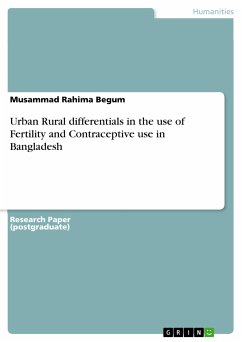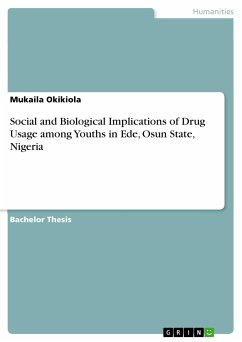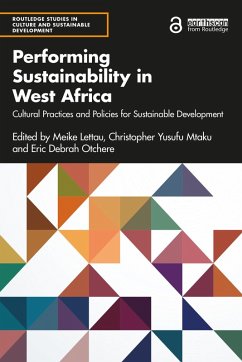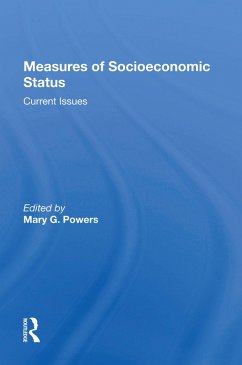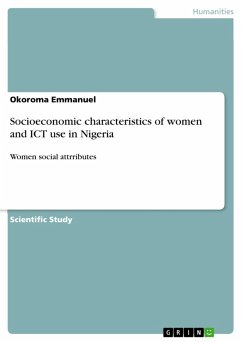
Socioeconomic characteristics of women and ICT use in Nigeria (eBook, PDF)
Women social attrributes
Sofort per Download lieferbar
Statt: 15,95 €**
13,99 €
inkl. MwSt. und vom Verlag festgesetzt.
**Preis der gedruckten Ausgabe (Broschiertes Buch)
Alle Infos zum eBook verschenkenWeitere Ausgaben:

PAYBACK Punkte
0 °P sammeln!
Scientific Study from the year 2012 in the subject Sociology - Individual, Groups, Society, Federal University of Technology, Owerri (School of Agriculture and Agricultural Technology), course: Agricultural Extension, language: English, abstract: Whereas men and women are both involved in the use of Information Communication Technologies ICTs they are confronted with varying socioeconomic challenge with the women bearing the brunt. Outside observed relative advantages of the men over the women in terms of literacy, Net educational enrolment and attendance, population distribution, women are mo...
Scientific Study from the year 2012 in the subject Sociology - Individual, Groups, Society, Federal University of Technology, Owerri (School of Agriculture and Agricultural Technology), course: Agricultural Extension, language: English, abstract: Whereas men and women are both involved in the use of Information Communication Technologies ICTs they are confronted with varying socioeconomic challenge with the women bearing the brunt. Outside observed relative advantages of the men over the women in terms of literacy, Net educational enrolment and attendance, population distribution, women are more productive; women provide greater labour force for the production system, engage in more physical and longer hour jobs both at home and outside the home. Notwithstanding the integral roles performed by women for greater productivity as well as the growing indispensability of ICTs in daily socioeconomic activities women in Nigeria are yet to adequately find their place in the world of ICTs. A lot of negativity still plagues the relationship between the use of ICTs and several aspects of women socioeconomic characteristics such as age, marital status, education, income and occupation. Several sociocultural issues are identified as factors militating against women access and use of ICTs such as gender sensitive norms and traditions, lack of finance, low education, lack of mobility and time. Formulation of gender friendly policies, capacity training in ICTs application, provision of formal loan schemes to provide financial aid to women among others are recommended as measures necessary to improve the situation. Keywords: Socioeconomic characteristics, women productivity, ICT.
Dieser Download kann aus rechtlichen Gründen nur mit Rechnungsadresse in A, B, BG, CY, CZ, D, DK, EW, E, FIN, F, GR, HR, H, IRL, I, LT, L, LR, M, NL, PL, P, R, S, SLO, SK ausgeliefert werden.







